
Apamea crenata, known as the clouded-bordered brindle, is a moth in the family Noctuidae. It is distributed throughout the Palearctic realm. In the North it crosses the Arctic Circle, in the Mediterranean it is found only in cool locations and mountains avoiding very hot areas. In the Alps, it rises to an altitude of about 2000 metres.

Dodona ouida, the mixed Punch, is a small but striking butterfly found in the Indomalayan realm in West China, Himalayas, Northeast India (hills) and Burma that belongs to the Punches and Judies, that is, the family Riodinidae.

Charaxes marmax, the yellow rajah, is a butterfly found in India that belongs to the rajahs and nawabs group, that is, the Charaxinae group of the brush-footed butterflies family.
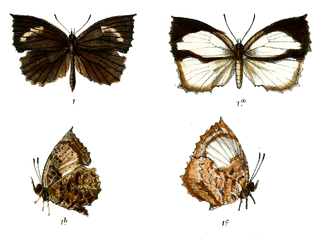
Allotinus drumila, the crenulate darkie, is a small butterfly found in India, Burma, Thailand, Laos, Vietnam, and Yunnan (China) that belongs to the lycaenids or blues family.

Junonia hierta, the yellow pansy, is a species of nymphalid butterfly found in the Palaeotropics. It is usually seen in open scrub and grassland habitats.

Hypolimnas misippus, the Danaid eggfly, mimic, or diadem, is a widespread species of nymphalid butterfly. It is well known for polymorphism and mimicry. Males are blackish with distinctive white spots that are fringed in blue. Females are in multiple forms that include male-like forms while others closely resemble the toxic butterflies Danaus chrysippus and Danaus plexippus.
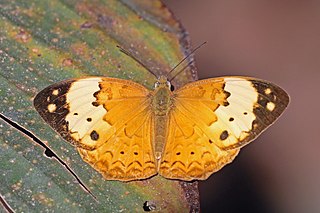
Cupha erymanthis, the rustic, is a species of brush-footed butterfly found in forested areas of tropical South Asia and Southeast Asia. The males and females are identical.

Curetis bulis, the bright sunbeam, is a species of butterfly belonging to the lycaenid family. It is found in Asia.
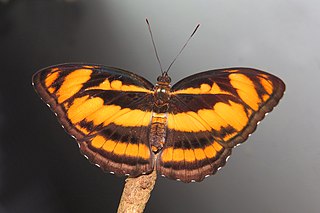
Athyma nefte, the colour sergeant, is a species of brush-footed butterfly found in tropical South and Southeast Asia.

Vindula erota, the common cruiser, is a species of nymphalid butterfly found in forested areas of tropical South Asia and Southeast Asia.
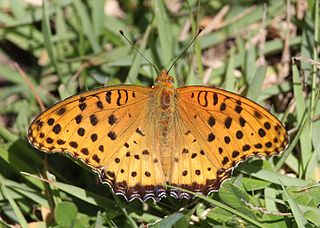
The Indian fritillary is a species of butterfly of the nymphalid or brush-footed family. It is usually found from south and southeast Asia to Australia.

Byblia ilithyia, the spotted joker or joker, is a species of nymphalid butterfly found in parts of Africa and Asia.

Amathuxidia amythaon, the koh-i-noor, is a butterfly found in Asia. It belongs to the Morphinae, a subfamily of the brush-footed butterflies.

Vagrans is monotypic genus with the species vagrant a species of nymphalid butterfly found in forested areas of tropical South Asia and Southeast Asia.

Catocala nymphagoga, the oak yellow underwing, is a moth of the family Erebidae. It is found in Southern Europe, from Bulgaria up to the Iberian Peninsula and sometimes further north as a migrant. It is also found in North Africa and Asia Minor.

Mesapamea secalis, the common rustic, is a moth of the family Noctuidae. The species was first described by Carl Linnaeus in his 1758 10th edition of Systema Naturae. It is found in Europe, north-west Africa, Turkey and northern Iran.

Cosmopterix chisosensis is a moth of the family Cosmopterigidae. It is known from Argentina and the United States.
Polygrammodes supremalis is a moth in the family Crambidae. It was described by William Schaus in 1920. It is found in Paraná, Brazil.
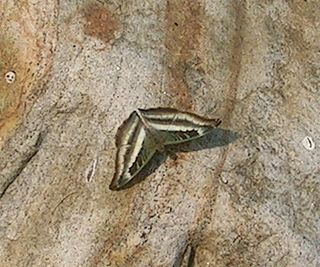
Auzakia is a monotypic butterfly genus in the family Nymphalidae. It contains the single species, Auzakia danava, the commodore, which is found from Tibet to Sumatra.
Striginiana nobilis is a moth in the family Eupterotidae. It was described by William Jacob Holland in 1893. It is found in Gabon.
















